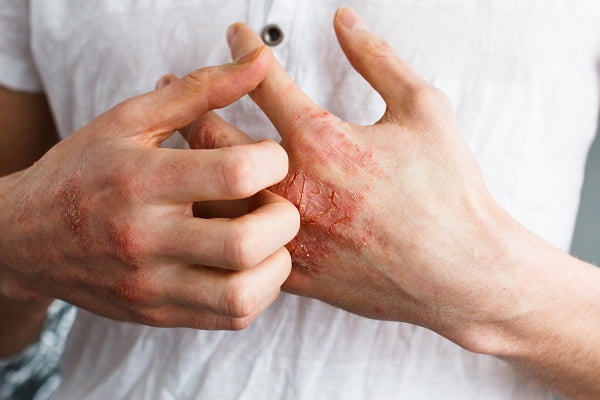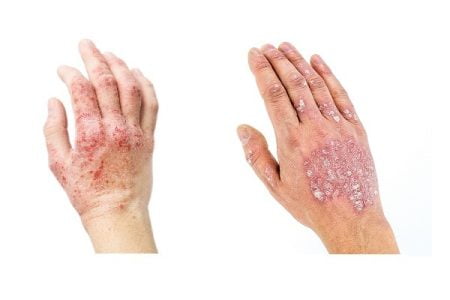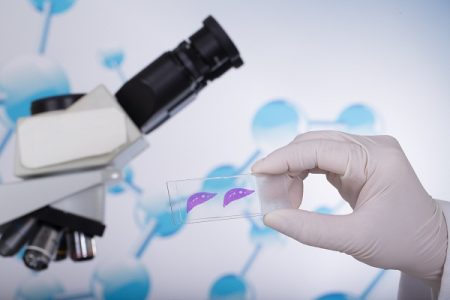An Overview of Eczema
- Updated on: Jun 28, 2024
- 4 min Read
- Published on Sep 25, 2019

What is Eczema?
Eczema is a very commonly noticed chronic, non-infectious skin problem, which is seen to affect children mainly. However, it can occur in infants and adults too.
It usually starts at infancy and lasts till childhood. Eczema is primarily a terminology coined for various types of skin problems. Your skin becomes swollen, inflamed, irritated, itchy, scaly, cracked, red, and rough.
Read about symptoms of eczema.
The most common type of eczema is termed as atopic dermatitis, or atopic eczema. It is seen to disappear temporarily or completely with age. Both genetic and environmental factors play a critical role in the development of eczema. Therefore, it is frequently observed in certain families.
Environmental factors such as smoke and pollen can also activate it. Certain diets such as nuts and dairy can trigger the symptoms of eczema.
There is no specific test to detect eczema. The disease is diagnosed mainly by reviewing family and personal history and by conducting physical examination of the patient.
The word eczema can be broadly depicted as firstly any reaction pattern in skin with a rash. At the onset of the disease, red, raised tiny blisters containing a clear fluid are seen. The stricken skin will ooze once the blisters break. Mostly, eczema is seen to be very itchy, though not contagious.
No cure has been found for it. The treatments presently available can only provide temporary relief from the symptoms. However, medical treatments and self-care measures can relieve itching and prevent any new outbreaks. Read about treatments of eczema.
Eczema is seen to improve or worsen over time. Individuals with eczema can also develop hay fever and asthma. When an irritant or an allergen triggers the immune system, the skin cells don’t behave as they should, this can result in an eczema flare-up. The affected areas in eczema usually appear quiet dry, thickened, or scaly.
Eczema in babies or toddlers
In babies, eczema symptoms appear as a red, crusty patch on the skin usually before five years of age. It is seen initially on the cheeks and scalp, but can progress to the arms, legs, chest, or other parts of the body. It is very common skin condition and curable too.
Mostly, the symptoms disappear with age. But sometimes, though rarely, some children develop it in adulthood too. Atopic dermatitis is the common eczema seen in the first six months to five years of a child’s life, which includes babies and toddlers.
Eczema in children
Atopic dermatitis is seen to affect the kids maximum. The skin appears itchy, red and inflamed. Rashes appear on the elbows, knees, neck, wrist, ankles, legs or bottoms.
Most of the children who get eczema in childhood continue to show the symptoms in adulthood too, though these symptoms differ to those experienced by babies or toddlers.
Eczema in adults
The most common eczema type experienced in adulthood is atopic eczema, which is characterized by intermittent flares and spontaneous remissions. In adults, hand dermatitis and red facial eczema are predominant.
Later in life, individuals may show symptoms of chronic lichenified, sub acute, or psoriasiform dermatitis too. Scratching and rubbing irritates and causes more damage to the skin, increasing inflammation, and thereby worsening itchiness. Eczema can be appropriately managed with medicines and by avoiding irritants in adults.
Types of eczema
Although there are eight distinct types of eczema, it is possible to have more than one type at a time. Each type of eczema shows itching and redness, but some of them may also cause blisters or peel.
The most common type of all eczema which can be severe and long lasting is atopic dermatitis.
Atopic dermatitis
It is a chronic skin condition. Studies reveal that individuals with a family history of atopic dermatitis, asthma or hay fever are more likely to develop atopic dermatitis themselves.
Contact dermatitis
It is seen when the skin touches irritating substances or allergens. This may lead to inflamed skin, causing burns, itches and redness. Contact dermatitis can be classified as irritant dermatitis and allergic dermatitis.
Dyshidrotic eczema
Irritation on palms of hands and soles of feet characterized by blisters, are the characteristics seen in this type of eczema. It is twice as common in women as seen in men.
Neurodermatitis or Lichen Simplex Chronicus
This type of eczema appears in patches on the neck, scalp, shoulders, feet, ankle, wrists, hands and legs. It can be triggered by an insect bite, stress or by dry skin in winters.
Hand eczema
This type of eczema is very commonly seen. Both genetics and contact with allergens or irritating substances like chemicals can trigger it.
Nummular eczema
This is also known as discoid eczema. It results in circular patches of irritated skin that can be crusted, scaling, and itchy. It can begin at any particular age. It appears different than the usual eczema and can be much more difficult to treat.
Seborrheic eczema
In this type of eczema, oily, scaly yellowish patches of skin are seen on scalp and face. This is a chronic form of eczema. One can develop it at any age.
It is more frequently seen in men than in women. Genes and hormones play a critical role in its development. Individuals with a weakened immune system are more prone to get it.
Stasis dermatitis
It results from circulatory problems, which may cause irritation on lower legs. It is also known as venous stasis dermatitis as it may develop due to a problem with blood flow in the veins and pressure resulted by the same.













